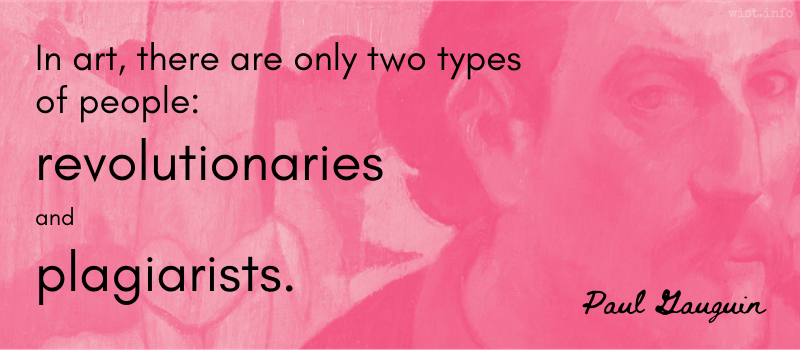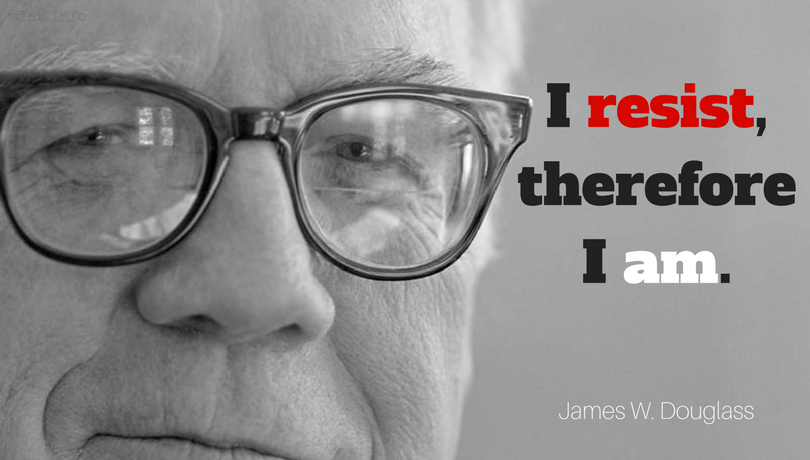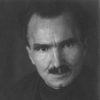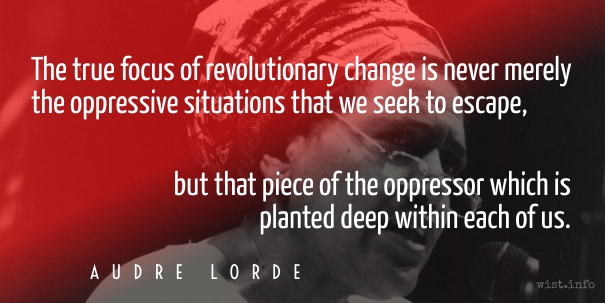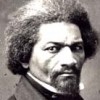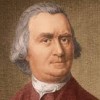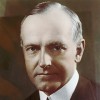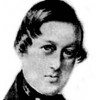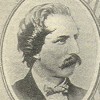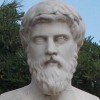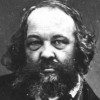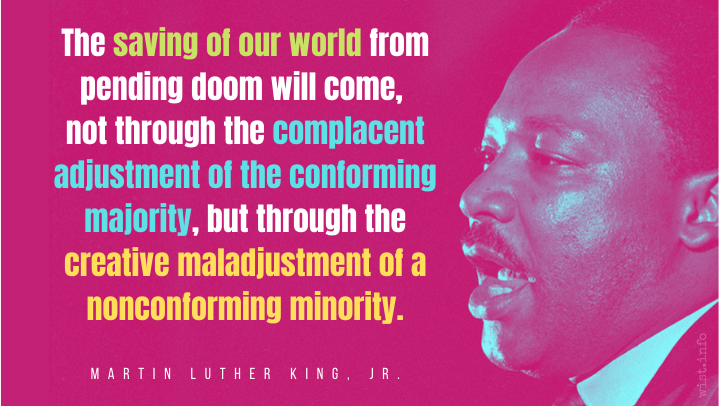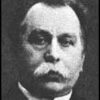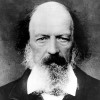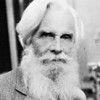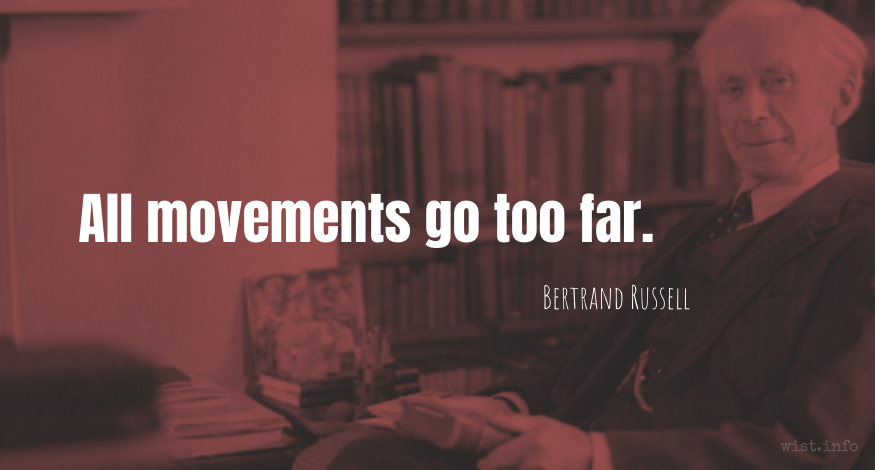The more I see of the moneyed classes, the more I understand the guillotine.
George Bernard Shaw (1856-1950) British playwright and critic
Letter (1899-09-25) to Edward Rose
(Source)
Written while on a six-week Mediterranean cruise.
Quotations about:
revolution
Note not all quotations have been tagged, so Search may find additional quotes on this topic.
But in the days that are now passing over us, even fools are arrested to ask the meaning of them; few of the generations of men have seen more impressive days. Days of endless calamity, disruption, dislocation, confusion worse confounded: if they are not days of endless hope too, then they are days of utter despair. For it is not a small hope that will suffice, the ruin being clearly, either in action or in prospect, universal. There must be a new world, if there is to be any world at all!
Thomas Carlyle (1795-1881) Scottish essayist and historian
Latter-Day Pamphlets, # 1 “The Present Time” (1850-02-01)
(Source)
This is that same Foulon named âme damnée du Parlement; a man grown gray in treachery, in griping, projecting, intriguing and iniquity: who once when it was objected, to some finance-scheme of his, “What will the people do?” — made answer, in the fire of discussion, “The people may eat grass”: hasty words, which fly abroad irrevocable, — and will send back tidings!
Thomas Carlyle (1795-1881) Scottish essayist and historian
The French Revolution: A History, Part 1, Book 3, ch. 9 (1.3.9) (1837)
(Source)
Writing of Joseph-François Foullon de Doué (1715-1789), French politician, the "damned soul of the Parliament," and a Controller-General of Finances under Louis XVI. Widely hated by "the people" for such statements and actions, he was one of the early targets of the French Revolution, as told in Dickens, A Tale of Two Cities. He was marched from his country hiding place back to Paris, with the mob shoving grass and hay into his face and mouth. He became the first recorded person to have been lynched from a lamp post. (The rope broke three times, so he was instead beheaded and his grass-stuffed head marched about on a pike.)
Among the lessons taught by the French Revolution, there is none sadder or more striking than this — that you may make everything else out of the passions of men except a political system that will work, and that there is nothing so pitilessly and unconsciously cruel as sincerity formulated into dogma.
James Russell Lowell (1819-1891) American diplomat, essayist, poet
“Abraham Lincoln” (1864), My Study Windows (1871)
(Source)
To do good to mankind is the chivalrous plan,
And is always as nobly requited;
Then battle for freedom wherever you can.
And, if not shot or hang’d, you’ll get knighted.
We used to think that revolution is the cause of change. Actually, it is the other way around: revolution is a by-product of change. Change comes first, and it is the difficulties and irritations inherent in change that set the stage for revolution. To say that revolution is the cause of change is like saying juvenile delinquency is the cause of the change from boyhood to manhood.
What is at issue here is relative poverty, not absolute poverty. Inferiority is a relative concept. When everyone is poor together, there is no shame in being poor. As Marx said, it is not living in a hovel that causes people to feel ashamed, it is living in a hovel next to a palace. And as he also said, shame is the emotion of revolution, i.e. of violence. But one does not have to be a Marxist, or subscribe to everything he said (and I do not), in order to see how correct his insight was.
James Gilligan (b. c. 1936) American psychiatrist and author
Preventing Violence, ch. 5 (2001)
(Source)
Most anarchists believe the coming change can only come through a revolution, because the possessing class will not allow a peaceful change to take place; still we are willing to work for peace at any price, except at the price of liberty.
Lucy Parsons (1851-1942) American labor organizer, anarchist, orator [a.k.a. Lucy Gonzalez]
“The Principles of Anarchism,” lecture (1905)
(Source)
Liberty, after she has been chained up awhile, is always more fierce, and sets her teeth in deeper, than she would otherwise have done if she had never been restrained.
[Acriores autem morsus sunt intermissae libertatis quam retentae.]
Marcus Tullius Cicero (106-43 BC) Roman orator, statesman, philosopher
De Officiis [On Duties; On Moral Duty; The Offices], Book 2, ch. 7 (2.7) / sec. 14 (44 BC) [tr. Cockman (1699)]
(Source)
(Source (Latin)). Alternate translations:And the inflictions of freedom interrupted, are more rigorous than if it had been retained.
[tr. McCartney (1798)]For the inflictions of liberty, when it has been suspended, are more severe than if it had been retained.
[tr. Edmonds (1865)]Men indeed feel more keenly the suppression of liberty than any evils incident to its preservation.
[tr. Peabody (1883)]Freedom, if suppressed, only bites with keener fang.
[tr. Gardiner (1899)]Freedom suppressed and again regained bites with keener fangs than freedom never endangered.
[tr. Miller (1913)]But the wounds caused by the suspension of freedom hurt worse than those caused by maintaining it.
[tr. Edinger (1974)]
Awful as silence. Hark! the rushing snow!
The sun-awakened avalanche! whose mass,
Thrice sifted by the storm, had gathered there
Flake after flake, in heaven-defying minds
As thought by thought is piled, till some great truth
Is loosened, and the nations echo round,
Shaken to their roots, as do the mountains now.
Remind them that the sword still hangs upon the wall and the heart still beats within the man, and that that sword will be unsheathed again, if necessary, in defense of your rights. Given them to understand that you will not stand patiently by and see your hard earnings squandered by a luxuriating class of idlers. If the American manhood will arouse itself and speak to those fellows in plain language, not to be misunderstood, they can save themselves, their country and their children, from the fate of poverty which awaits them. Will you do it?
Lucy Parsons (1851-1942) American labor organizer, anarchist, orator [a.k.a. Lucy Gonzalez]
“Wage Slaves vs. Corporations,” The Liberator (24 Sep 1905)
(Source)
What has ever been granted to the countless millions of workers of Earth without a fight? Czar Nicholas has discovered that he is not all Russia. Will he “let the voice of the people be heard”? Was it argument or force that changed Czar Nicholas’s mind? Well , the Russian people have gotten the thin edge of the wedge in; let them keep striking hard, they will split the throne after a while.
Lucy Parsons (1851-1942) American labor organizer, anarchist, orator [a.k.a. Lucy Gonzalez]
“On Revolution in Russia and Chinese Use of the Boycott,” The Liberator (3 Sep 1905)
(Source)
Independence was an act of revolution; republicanism was something new under the sun; the federal system was a vast experimental laboratory. Physically Americans were pioneers; in the realm of social and economic institutions, too, their tradition has been one of pioneering. From the beginning, intellectual and spiritual diversity have been as characteristic of America as racial and linguistic. The most distinctively American philosophies have been transcendentalism — which is the philosophy of the Higher Law — and pragmatism — which is the philosophy of experimentation and pluralism. These two principles are the very core of Americanism: the principle of the Higher Law, or of obedience to the dictates of conscience rather than of statutes, and the principle of pragmatism, or the rejection of a single good and of the notion of a finished universe. From the beginning Americans have known that there were new worlds to conquer, new truths to be discovered. Every effort to confine Americanism to a single pattern, to constrain it to a single formula, is disloyalty to everything that is valid in Americanism.
Everyone loves the Revolution. We only disagree on whether it has occurred.
James Richardson (b. 1950) American poet
“Vectors: 56 Aphorisms and Ten-second Essays,” Michigan Quarterly Review, # 8 (Spring 1999)
(Source)
Contumely always falls upon those who break through some custom or convention. Such men, in fact, are called criminals. Everyone who overthrows an existing law is, at the start, regarded as a wicket man. Long afterward, when it is found that this law was bad and so cannot be re-established, the epithet is changed. All history treats almost exclusively of wicked men who, in the course of time, have come to be looked upon as good men. All progress is the result of successful crimes.
Friedrich Nietzsche (1844-1900) German philosopher and poet
The Dawn [Morgenröte], sec. 20 (1881) [Mencken (1907)]
(Source)
Alternate translations:We have to make good a great deal of the contumely which has fallen on all those who, by their actions, have broken through the conventionality of some custom -- such people generally have been called criminals. Everybody who overthrew the existing moral law has hitherto, at least in the beginning, been considered a wicked man; but when afterwards, as sometimes happened, the old law could not be re-established and had to be abandoned, the epithet was gradually changed. History almost exclusively treats of such wicked men who, in the course of time, have been declared good men.
[tr. Volz (1903)]One has to take back much of the defamation which people have cast upon all those who broke through the spell of a custom by means of a deed -- in general, they are called criminals. Whoever has overthrown an existing law of custom has hitherto always first been accounted a bad man: but when, as did happen the laws could not afterwards be reinstated and this fact was accepted, the predicate gradually changed -- history treats almost exclusively of these bad men who subsequently became good men!
[tr. Hollingdale (1997)]
The parliamentary battle of the NSDAP [Nazi Party] had the single purpose of destroying the parliamentary system from within through its own methods. It was necessary above all to make formal use of the possibilities of the party-state system but to refuse real cooperation and thereby to render the parliamentary system, which is by nature dependent upon the responsible cooperation of the opposition, incapable of action.
Ernst Rudolf Huber (1903-1990), German jurist and constitutional historian
Constitutional Law of the Greater German Reich [Verfassungsrecht des Grossdeutschen Reiches] (1939)
(Source)
Reprinted in National Socialism, US State Department (1943).
A person, an individual being, has a thousand ways of conveying his feelings and thoughts. He is riches without end, he is a world in which we can always discover something new. A crowd, on the other hand, reduces the individuality of the person; a man in a crowd limits himself to a few forms of elementary behavior. The forms through which a crowd can express its yearnings are extraordinarily meager and continually repeat themselves: the demonstration, the strike, the rally, the barricades. That is why you can write a novel about a man, but about a crowd — never.
Ryszard Kapuściński (1932-2007) Polish journalist, photographer, poet, author
Shah of Shahs, Part 3 “The Dead Flame” (1982)
(Source)
Except for the field organizers of strikes, who were pretty tough monkeys and devoted, most of the so-called Communists I met were middle-class, middle-aged people playing a game of dreams. I remember a woman in easy circumstances saying to another even more affluent: “After the revolution even we will have more, won’t we, dear?” Then there was another lover of proletarians who used to raise hell with Sunday picnickers on her property.
I guess the trouble was that we didn’t have any self-admitted proletarians. Everyone was a temporarily embarrassed capitalist. Maybe the Communists so closely questioned by the investigation committees were a danger to America, but the ones I knew — at least they claimed to be Communists — couldn’t have disrupted a Sunday-school picnic. Besides they were too busy fighting among themselves.
John Steinbeck (1902-1968) American writer
Essay (1960-06-01), “A Primer on the Thirties,” Esquire
(Source)
Collected in Esquire: The Best of Forty Years (1973).
A portion of this was paraphrased in Ronald Wright, A Short History of Progress, ch. 5 "The Rebellion of the Tools" (2004):John Steinbeck once said that socialism never took root in America because the poor see themselves not as an exploited proletariat but as temporarily embarrassed millionaires.
That paraphrase has, in turn, been frequently given as a direct quotation of Steinbeck.
After any disturbance (such as two world wars coinciding with a period of growing economic and monetary incomprehensibility) we find our old concepts inadequate and look for new ones. But it unfortunately happens that the troubled times which produce an appetite for new ideas are the least propitious for clear thinking.
Rebecca West (1892-1983) British author, journalist, literary critic, travel writer [pseud. for Cicily Isabel Fairfield]
In The Sunday Telegraph, London (1981)
(Source)
Inferiors revolt in order that they may be equal, and equals that they may be superior.
Aristotle (384-322 BC) Greek philosopher
Politics [Πολιτικά], Book 5, ch. 2 / 1302a.29 [tr. Jowett (1885)]
(Source)
Alternate translations:
- "Now, what they aim at may be either just or unjust; just, when those who are inferior are seditious, that they may be equal; unjust, when those who are equal are so, that they may be superior." [tr. Ellis (1912)]
- "When inferior, people enter on strife in order that they may be equal, and when equal, in order that they may be greater." [tr. Rackham (1932)]
- "The lesser engage in factional conflict in order to be equal; those who are equal, in order to be greater." [tr. Lord (1984)]
Totalitarianism begins in contempt for what you have. The second step is the notion: “Things must change — no matter how, Anything is better than what we have.” Totalitarian rulers organize this kind of mass sentiment, and by organizing it articulate it, and by articulating it make the people somehow love it.
Hannah Arendt (1906-1975) German-American philosopher, political theorist
Interview with Roger Errera (Oct 1973), The New York Review of Books (26 Oct 1978)
(Source)
When smashing monuments, save the pedestals — they always come in handy.
[Burząc pomniki, oszczędzajcie cokoły. Zawsze mogą się przydać.]
Stanislaw Lec (1909-1966) Polish aphorist, poet, satirist
Unkempt Thoughts [Myśli nieuczesane] (1957) [tr. Gałązka (1962)]
(Source)
The art of leadership is a serious matter. One must not lag behind a movement, because to do so is to become isolated from the masses. But one must not rush ahead, for to rush ahead is to lose contact with the masses. He who wishes to lead a movement and at the same time keep touch with the vast masses, must conduct a fight on two fronts, against those who lag behind and against those who rush ahead.
Josef Stalin (1879-1953) Georgian revolutionary and Soviet dictator
Leninism, Vol. 2 (1926) [tr. Paul (1933)]
(Source)
Often elided, "He who wishes to lead a movement must conduct a fight on two fronts, against those who lag behind and against those who rush ahead."
A revolution requires of its leaders a record of unbroken infallibility; if they do not possess it, they are expected to invent it.
Murray Kempton (1917-1997) American journalist.
Part of Our Time: Some Ruins & Monuments of the Thirties, ch. 3 (1955)
(Source)
The art of holding onto power is the American system’s special grace. The trick is to make reform seem so tantalizingly close as to dull the edge of militancy and force the purest revolutionaries into the peripheries of political action.
Andrew Kopkind (1935-1994) American journalist
“Are We in the Middle of a Revolution?” New York Times Magazine (10 Nov 1968)
(Source)
In art, there are only two types of people: revolutionaries and plagiarists. And in the end, doesn’t the revolutionary’s work become official, once the State takes it over?
Paul Gauguin (1848-1903) French painter [Eugène Henri Paul Gauguin]
Letter in Le Soir (25 Apr 1895)
Collected in Daniel Guérin, ed., The Writings of a Savage (1996) [tr. Levieux].
Often given as "Art is either plagiarism or revolution," or sometimes "Art is either a revolutionist or a plagiarist." This is often cited from James Huneker, The Pathos of Distance (1913), but there it is given as a paraphrase: "Paul Gauguin has said that in art one is either a plagiarist or a revolutionary."
(Huneker's book elsewhere contains the parallel paraphrase, "Paul Gauguin has said that all artists are either revolutionists or reactionists.")
But if physical death is the price that a man must pay to free his children and his white brethren from a permanent death of the spirit, then nothing could be more redemptive. This is the type of soul force that I am convinced will triumph over the physical force of the oppressor.
Martin Luther King, Jr. (1929-1968) American clergyman, civil rights leader, social activist, preacher
“The Rising Tide of Racial Consciousness,” Speech, National Urban League, New York (6 Sep 1960)
(Source)
Abuse is a proof that you are felt. If they praise you, you will work no revolution.
For the Bolsheviki the end to be achieved was the Communist State, or the so-called Dictatorship of the Proletariat. Everything which advanced that end was justifiable and revolutionary. The Lenins, Radeks, and Zorins were therefore quite consistent. Obsessed by the infallibility of their creed, giving of themselves to the fullest, they could be both heroic and despicable at the same time. They could work twenty hours a day, live on herring and tea, and order the slaughter of innocent men and women. Occasionally they sought to mask their killings by pretending a “misunderstanding,” for doesn’t the end justify all means? They could employ torture and deny the inquisition, they could lie and defame, and call themselves idealists. In short, they could make themselves and others believe that everything was legitimate and right from the revolutionary viewpoint; any other policy was weak, sentimental, or a betrayal of the Revolution.
Emma Goldman (1869-1940) Lithuanian-American anarchist, activist
My Disillusionment in Russia, ch. 12 (1920)
(Source)
I’d be the first to say that some historical victories have been won by violence; the U.S. Revolution is certainly one of the foremost. But the Negro revolution is seeking integration, not independence. Those fighting for independence have the purpose to drive out the oppressors. But here in America, we’ve got to live together. We’ve got to find a way to reconcile ourselves to living in community, one group with the other. The struggle of the Negro in America, to be successful, must be waged with resolute efforts, but efforts that are kept strictly within the framework of our democratic society. This means reaching, educating and moving large enough groups of people of both races to stir the conscience of the nation.
Martin Luther King, Jr. (1929-1968) American clergyman, civil rights leader, social activist, preacher
Playboy interview (Jan 1965)
(Source)
Violence as a way of achieving racial justice is both impractical and immoral. It is impractical because it is a descending spiral ending in destruction for all. The old law of an eye for an eye leaves everybody blind. It is immoral because it seeks to humiliate the opponent rather than win his understanding; it seeks to annihilate rather than to convert. Violence is immoral because it thrives on hatred rather than love. It destroys community and makes brotherhood impossible. It leaves society in monologue rather than dialogue. Violence ends by defeating itself. It creates bitterness in the survivors and brutality in the destroyers.
Martin Luther King, Jr. (1929-1968) American clergyman, civil rights leader, social activist, preacher
Stride Toward Freedom, ch. 11 “Where Do We Go from Here?” (1958)
(Source)
From the standpoint of a professional military man there is one good thing about revolutions: the opportunities for swift promotion are excellent . . . even if the pay is inclined to be irregular.
History unfortunately leaves some people oppressed and some people oppressors. And there are three ways that individuals who are oppressed can deal with their oppression. One of them is to rise up against their oppressors with physical violence and corroding hatred. But oh this isn’t the way. For the danger and the weakness of this method is its futility. Violence creates many more social problems than it solves. And I’ve said, in so many instances, that as the Negro, in particular, and colored peoples all over the world struggle for freedom, if they succumb to the temptation of using violence in their struggle, unborn generations will be the recipients of a long and desolate night of bitterness, and our chief legacy to the future will be an endless reign of meaningless chaos. Violence isn’t the way.
Martin Luther King, Jr. (1929-1968) American clergyman, civil rights leader, social activist, preacher
“Loving Your Enemies,” Sermon, Dexter Avenue Baptist Church, Montgomery (17 Nov 1957)
(Source)
I resist, therefore I am.
James W. "Jim" Douglass (b. 1937) American author, activist, Christian theologian
“Revolution through Solitude,” Resistance and Contemplation (1972)
(Source)
War is a simple matter compared with revolution. War is an applied science, with well-defined principles tested in history; analogous solutions may be found from ballista to H-bomb. But every revolution is a freak, a mutant, a monstrosity, its conditions never to be repeated and its operations carried out by amateurs and individualists.
Love responsibility. Say: “It is my duty, and mine alone, to save the earth. If it is not saved, then I alone am to blame.” Love each man according to his contribution in the struggle. Do not seek friends; seek comrades-in-arms.
Nikos Kazantzakis (1883-1957) Greek writer and philosopher
The Saviors of God [Salvatores Dei], “The March: First Step: The Ego,” #15-16 (1923) [tr. Friar [1960])
(Source)
The biggest sin is sitting on your ass.
Florynce "Flo" Kennedy (1916-2000) American lawyer, feminist, civil rights activist
(Attributed)
(Source)
Quoted in Gloria Steinem, "The Verbal Karate of Florynce R. Kennedy, Esq.," Ms. (Mar 1973).
Full quote: "Some people say they won’t work 'inside the system' -- they’re 'waiting for the revolution.' Well, when the ramparts are open, honey, I'll be there. But until then, I'm going to go right on zapping the business and government delinquents, the jockocrats, the fetus fetishists, and all the other niggerizers any way I can. The biggest sin is sitting on your ass."
This is no day for the rabble-rouser, whether he be Negro or white. We must realize that we are grappling with the most weighty social problem of this nation, and in grappling with such a complex problem there is no place for misguided emotionalism. We must work passionately and unrelentingly for the goal of freedom, but we must be sure that our hands are clean in the struggle. We must never struggle with falsehood, hate, or malice. We must never become bitter. I know how we feel sometime. There is the danger that those of us who have been forced so long to stand amid the tragic midnight of oppression—those of us who have been trampled over, those of us who have been kicked about — there is the danger that we will become bitter. But if we will become bitter and indulge in hate campaigns, the new order which is emerging will be nothing but a duplication of the old order.
Martin Luther King, Jr. (1929-1968) American clergyman, civil rights leader, social activist, preacher
“Give Us the Ballot,” Speech, Prayer Pilgrimage for Freedom, Washington, DC (1957)
(Source)
When I put a question to him about socialism in agriculture, he explained with glee how he had incited the poorer peasants against the richer ones, “and they soon hanged them from the nearest tree — ha! ha! ha!” His guffaw at the thought of those massacred made my blood run cold.
The process which, if not checked, will abolish Man goes on apace among Communists and Democrats no less than among Fascists. The methods may (at first) differ in brutality. But many a mild-eyed scientist in pince-nez, many a popular dramatist, many an amateur philosopher in our midst, means in the long run just the same as the Nazi rulers of Germany: ‘Traditional values are to be debunked’ and mankind to be cut out into some fresh shape at the will (which must, by hypothesis, be an arbitrary will) of some few lucky people in one lucky generation which has learned how to do it.
C. S. Lewis (1898-1963) English writer, literary scholar, lay theologian [Clive Staples Lewis]
The Abolition of Man (1943)
(Source)
We repudiate all morality which proceeds from supernatural ideas or ideas which are outside the class conception. In our opinion, morality is entirely subordinate to the interests of the class war; everything is moral which is necessary for the annihilation of the old exploiting social order and for uniting the proletariat. Our morality consists solely in close discipline and conscious warfare against the exploiters.
Vladimir Ilich Lenin (1870-1924) Russian politician, revolutionary, political theorist [b. Vladimir Ilich Ulyamov]
(Attributed)
(Source)
Quoted in René Fülöp-Miller, Lenin and Gandhi (1927).
Comfort and habits let us be ready to forgo, but I am not ready for a creed which does not care how much it destroys the liberty and security of daily life, which uses deliberately the weapons of persecution, destruction and international strife. How can I admire a policy which finds a characteristic expression in spending millions to suborn spies in every family and group at home, and to stir up trouble abroad?
Revolutions, as a long and bitter experience reveals, are apt to take their colour from the régime which they overthrow. Is it any wonder that the creed which affirms the absolute rights of property should sometimes be met with a counter-affirmation of the absolute rights of labour, less anti-social, indeed, and inhuman, but almost as dogmatic, almost as intolerant and thoughtless as itself.
R. H. Tawney (1880-1962) English writer, economist, historian, social critic [Richard Henry Tawney]
The Acquisitive Century, ch. 3 “The Acquisitive Society” (1920)
(Source)
The splendor of the goal of the French Revolution is simultaneously the source of our strength and of our weakness: our strength, because it gives us an ascendancy of truth over falsehood, and of public rights over private interests; our weakness, because it rallies against us all vicious men, all those who in their hearts seek to despoil the people . … It is necessary to stifle the domestic and foreign enemies of the Republic or perish with them. Now in these circumstances, the first maxim of our politics ought to be to lead the people by means of reason and the enemies of the people by terror. If the basis of popular government in time of peace is virtue, the basis of popular government in time of revolution is both virtue and terror: virtue without which terror is murderous, terror without which virtue is powerless. Terror is nothing else than swift, severe, indomitable justice; it flows, then, from virtue.
Maximilien Robespierre (1758-174) French lawyer, politician, revolutionary leader
Speech, National Convention (7 May 1794)
(Source)
In a parallel thought, he wrote in On the Principles of Political Morality (1794):
If virtue be the spring of a popular government in times of peace, the spring of that government during a revolution is virtue combined with terror: virtue, without which terror is destructive; terror, without which virtue is impotent. Terror is only justice prompt, severe and inflexible; it is then an emanation of virtue; it is less a distinct principle than a natural consequence of the general principle of democracy, applied to the most pressing wants of the country.
We know the redemption must come. The time and the manner of its coming we know not: It may come in peace, or it may come in blood; but whether in peace or in blood, LET IT COME.
John Quincy Adams (1767-1848) US President (1825-29)
Speech to “The colored people of Pittsburge, Pennsylvania” (1843)
Representative Dellet of Alabama quoted the speech before the House of Representatives, then asked Adams, "though it cost the blood of thousands of white men?" Adams responded, "Though it cost the blood of millions of white men, let it come. Let justice be done, though the heavens fall."
We have this fantasy that our interests and the interests of the super-rich are the same, like somehow the rich will eventually get so full that they’ll explode, and the candy will rain down on the rest of us, like there’s some sort of piñata of benevolence. But here’s the thing about a piñata: it doesn’t open on its own. You have to beat it with a stick.
For the master’s tools will never dismantle the master’s house. They may allow us to temporarily beat him at his own game, but they will never enable us to bring about genuine change.
Audre Lorde (1934-1992) American writer, feminist, civil rights activist
“The Master’s Tools Will Never Dismantle the Master’s House” (1979)
(Source)
The true focus of revolutionary change is never merely the oppressive situations that we seek to escape, but that piece of the oppressor which is planted deep within each of us.
Under a tyranny, most friends are a liability. One quarter of them turn “reasonable” and become your enemies, one quarter are afraid to speak, and one quarter are killed and you die with them. But the blessed final quarter keep you alive.
There is a crime here that goes beyond denunciation. There is a sorrow here that weeping cannot symbolize. There is a failure here that topples all our success. The fertile earth, the straight tree rows, the sturdy trunks, and the ripe fruit. And children dying of pellagra must die because a profit cannot be taken from an orange. And coroners must fill in the certificate — died of malnutrition — because the food must rot, must be forced to rot.
In the eyes of the people there is the failure; and in the eyes of the hungry there is a growing wrath. In the souls of the people the grapes of wrath are filling and growing heavy, growing heavy for the vintage.
The voice of passion is better than the voice of reason.
The passionless cannot change history.Czesław Miłosz (1911-2004) Polish-Lithuanian poet, essayist, diplomat
“The Child of Europe” (1946)
(Source)
Find out just what any people will quietly submit to, and you have found out the exact amount of injustice and wrong which will be imposed upon them; and these will continue till they are resisted with either words or blows, or with both. The limits of tyrants are prescribed by the endurance of those whom they oppress.
I think perhaps we want a more conscious life. We’re tired of drudging and sleeping and dying. We’re tired of seeing just a few people able to be individualists. We’re tired of always deferring hope till the next generation. We’re tired of hearing politicians and priests and cautious reformers (and the husbands!) coax us, “Be calm! Be patient! Wait! We have the plans for a Utopia already made; just wiser than you.” For ten thousand years they’ve said that. We want our Utopia now — and we’re going to try our hands at it.
Sinclair Lewis (1885-1951) American novelist, playwright
Main Street, ch. 16 [Carol] (1920)
(Source)
Peace does not appear so distant as it did. I hope it will come soon, and come to stay; and so come as to be worth the keeping in all future time. It will then have been proved that, among free men, there can be no successful appeal from the ballot to the bullet; and that they who take such appeal are sure to lose their case, and pay the cost.
Every successful revolution puts on in time the robes of the tyrant it has deposed.
Barbara W. Tuchman (1912-1989) American historian and author
Stilwell and the American Experience in China, 1911-1945, ch. 8 (1972)
(Source)
When the gap between the ideal and real becomes too wide, the system breaks down.
Barbara W. Tuchman (1912-1989) American historian and author
A Distant Mirror: The Calamitous 14th Century, Foreward (1978)
(Source)
With hearts fortified with these animating Reflections, we most solemnly, before God and the World, declare, that, exerting the utmost Energy of those Powers, which our beneficent Creator hath graciously bestowed upon us, the Arms we have been compelled by our Enemies to assume, we will, in defiance of every Hazard, with unabating Firmness and Perseverance, employ for the preservation of our Liberties; being with one Mind resolved to die Freemen rather than to live Slaves.
Thomas Jefferson (1743-1826) American political philosopher, polymath, statesman, US President (1801-09)
“Declaration of the Causes and Necessity for Taking Up Arms” (1775-07-06) [with John Dickinson]
(Source)
Final version as approved by the Continental Congress. An earlier draft by Jefferson used these terms:We do, then, most solemnly before God and the world declare that regardless of every consequence, at the risk of every distress, the arms we have been compelled to assume we will use with perseverance, exerting to their utmost energies all those powers which our Creator hath given us to preserve that liberty which he committed to us in sacred deposit and to protect from every hostile hand our lives and our properties.
It does not require a majority to prevail, but rather an irate, tireless minority keen to set brush fires in people’s minds.
Unhappy it is though to reflect, that a Brother’s Sword has been sheathed in a Brother’s breast, and that, the once happy and peaceful plains of America are either to be drenched with Blood, or Inhabited by Slaves. Sad alternative! But can a virtuous Man hesitate in his choice?
George Washington (1732-1799) American military leader, Founding Father, US President (1789-1797)
Letter to George William Fairfax (31 May 1775)
(Source)
Man cannot live without hope. If it is not engendered by his own convictions and desires, it can easily be fired from without, and by the most meretricious and empty of promises.
Eleanor Roosevelt (1884-1962) First Lady of the US (1933-45), politician, diplomat, activist
“What Has Happened to the American Dream?” Atlantic Monthly (Apr 1961)
(Source)
A riot is the language of the unheard.
Martin Luther King, Jr. (1929-1968) American clergyman, civil rights leader, social activist, preacher
“The Other America,” speech, Stanford University (14 Apr 1967)
(Source)
The conservative has but little to fear from the man whose reason is the servant of his passions, but let him beware of him in whom reason has become the greatest and most terrible of the passions. These are the wreckers of outworn empires and civilisations, doubters, disintegrators, deiciders.
J.B.S. Haldane (1892-1964) English geneticist [John Burden Sanderson Haldane]
“Daedalus, or Science and the Future,” speech, Cambridge (24 Feb 1923)
(Source)
July 4, 1776 was a day of history in its high and true significance. Not because the underlying principles set out in the Declaration of Independence were new; they are older than the Christian religion, or Greek philosophy, nor was it because history is made by proclamation of declaration; history is made only by action. But it was an historic day because the representatives of three millions of people vocalized Concord, and Lexington, and Bunker Hill, which gave notice to the world that they proposed to establish an independent nation on the theory that “all men are created equal, that they are endowed by their creator with certain inalienable rights, that among these are life, liberty, and the pursuit of happiness.” The wonder and glory of the American people is not the ringing Declaration of that day, but the action then already begun, and in the process of being carried out, in spite of every obstacle that war could interpose, making the theory of freedom and equality a reality.
It was not the mere matter of the separation of the colonies from the motherland; but something in the Declaration giving liberty, not alone to the people of this country, but hope to the world for all future time. It was that which gave promise that in due time the weights should be lifted from the shoulders of all men, and that all should have an equal chance. This is the sentiment embodied in that Declaration of Independence.
Rebels and dissidents challenge the complacent belief in a just world, and, as the theory would predict, they are usually denigrated for their efforts. While they are alive, they may be called “cantankerous,” “crazy,” “hysterical,” “uppity,” or “duped.” Dead, some of them become saints and heroes, the sterling characters of history. It’s a matter of proportion. One angry rebel is crazy, three is a conspiracy, fifty is a movement.
Traters, I will here remark, are a onfortnit class of peple. If they wasn’t, they wouldn’t be traters. They conspire to bust up a country — they fail, and they’re traters. They bust her, and they become statesmen and heroes.
[Traitors, I will here remark, are an unfortunate class of people. If they weren’t, they wouldn’t be traitors. They conspire to bust up a country — they fail, and they’re traitors. They bust her, and they become statesmen and heroes.]
I used to be very revolutionary, but now I think that nothing can be gained by brute force. People must be drawn to good by goodness.
Boris Pasternak (1890-1960) Russian poet, novelist, and literary translator
Doctor Zhivago [До́ктор Жива́го], Part 2, ch. 8 “Arrival,” sec. 5 [Yury] (1955) [tr. Hayward & Harari (1958), US ed.]
(Source)
Alternate translations:I used to be very revolutionary-minded, but now I think that nothing can be gained by violence. People must be drawn to good by goodness.
[tr. Hayward & Harari (1958), UK ed.]I used to be in a very revolutionary mood, but now I think that we'll gain nothing by violence. People must be drawn to the good by the good.
[tr. Pevear & Volokhonsky (2010)]
But revolutions are made by fanatical men of action with one-track minds, geniuses in their ability to confine themselves to a limited field. They overturn the old order in a few hours or days, the whole upheaval takes a few weeks or at most years, but the fanatical spirit that inspired the upheavals is worshipped for decades thereafter, for centuries.
Boris Pasternak (1890-1960) Russian poet, novelist, and literary translator
Doctor Zhivago [До́ктор Жива́го], Part 2, ch. 14 “Return to Varykino,” sec. 14 (1955) [tr. Hayward & Harari (1958), US ed.]
(Source)
Alternate translations:But revolutions are made by fanatical men of action with one-track minds, men who are narrow-minded to the point of genius. They overturn the old order in a few hours or days; the whole upheaval takes a few weeks or at most years, but for decades thereafter, for centuries, the spirit of narrowness which led to the upheaval is worshipped as holy.
[tr. Hayward & Harari (1958), UK ed., "Again Varykino"]Revolutions are produced by men of action, one-sided fanatics, geniuses of self-limitation. In a few hours or days they overturn the old order. The upheavals last for weeks, for years at the most, and then for decades, for centuries, people bow down to the spirit of limitation that led to the upheavals as to something sacred.
[tr. Pevear & Volokhonsky (2010), "In Varykino Again"]
CAESAR: Let me have men about me that are fat;
Sleek-headed men and such as sleep o’ nights:
Yon Cassius has a lean and hungry look;
He thinks too much; such men are dangerous.
When it was told that Antony and Dolabella were in a plot against him, Caesar said he did not fear such fat, luxurious men, but rather the pale, lean fellows, meaning Cassius and Brutus.
Nothing stands between the people’s miserable present and its glorious future, except a minority, perhaps a majority, of perverse or merely ignorant individuals. All that is necessary is to liquidate a few thousands, or it may be a few millions, of these living obstacles to progress, and then to coerce and propagandize the rest into acquiescence. When these unpleasant but necessary preliminaries are over, the governage will begin. Such is the theory that secular apocalypticism, which is the religion of the revolutionaries. But in practice, it is hardly necessary to say, the means employed positively guarantee that the end actually reached shall be profoundly different form that which the prophetic theorists envisage.
Take the most radical revolutionist and place him upon the all-Russian throne or give him dictatorial power, for which so many of our green revolutionists daydream, and within a year he will have become worse than the Emperor himself.
There is nothing more difficult to carry out, nor more doubtful of success, nor more dangerous to handle, than to initiate a new order of things. For the reformer has enemies in all those who profit by the old order, and only lukewarm defenders in all those who would profit by the new order, this lukewarmness arising partly from fear of their adversaries, who have the laws in their favor; and partly from the incredulity of mankind, who do not truly believe in anything new until they have actual experience of it.
Niccolò Machiavelli (1469-1527) Italian politician, philosopher, political scientist
The Prince, ch. 6 (1513) [tr. Ricci (1903)]
Alt. trans.: "Nothing is more difficult to transact, nor more dubious to succeed, nor more dangerous to manage, than to make oneself chief to introduce new orders. Because the introducer has for enemies all those whom the old orders benefit, and has for lukewarm defenders all those who might benefit from the new orders. [tr. Codevilla]
Prudence, indeed, will dictate that Governments long established should not be changed for light and transient causes; and accordingly all experience hath shewn, that mankind are more disposed to suffer, while evils are sufferable, than to right themselves by abolishing the forms to which they are accustomed. But when a long train of abuses and usurpations, pursuing invariably the same Object evinces a design to reduce them under absolute Despotism, it is their right, it is their duty, to throw off such Government, and to provide new Guards for their future security.
Thomas Jefferson (1743-1826) American political philosopher, polymath, statesman, US President (1801-09)
“Declaration of Independence” (1776-07-04)
(Source)
As modified and approved by the Continental Congress. Jefferson's "original rough draft" is very similar:Prudence indeed will dictate that governments long established should not be changed for light & transient causes: and accordingly all experience hath shewn that mankind are more disposed to suffer while evils are sufferable, than to right themselves by abolishing the forms to which they are accustomed. but when a long train of abuses & usurpations, begun at a distinguished period, & pursuing invariably the same object, evinces a design to subject them to arbitrary power, it is their right, it is their duty, to throw off such government & to provide new guards for their future security.
Everywhere inequality is a cause of revolution, but an inequality in which there is no proportion — for instance, a perpetual monarchy among equals; and always it is the desire of equality which rises in rebellion.
Aristotle (384-322 BC) Greek philosopher
Politics [Πολιτικά], Book 5, ch. 1, sec. 11 / 1301b [tr. Jowett (1865)]
(Source)
Alternate translations:
- "Inequality is always the occasion of sedition, but not when those who are unequal are treated in a different manner correspondent to that inequality. Thus kingly power is unequal when exercised over equals. Upon the whole, those who aim after an equality are the cause of seditions." [tr. Ellis (1912)]
- "For party strife is everywhere due to inequality, where classes that are unequal do not receive a share of power in proportion (for a lifelong monarchy is an unequal feature when it exists among equals); for generally the motive for factious strife is the desire for equality." [tr. Rackham (1932)]
- "Factional conflict is everywhere the result of inequality, at any rate where there is no proportion among those who are unequal (a permanent kingship is unequal if it exists among equal persons); in general, it is equality they seek when they engage in factional conflict." [tr. Lord (1984)]
- "Faction, indeed, is everywhere due to inequality, when unequals do not receive what is proportionate (for example, a permanent kingship is unequal if it exists among equals), since people generally engage in faction in pursuit of equality." [tr. Reeve (2007)]
People here expect a revolution. There will be no revolution, none that deserves to be called so. There may be a scramble for money. But as the people we see want the things we now have and not better things, it is very certain that they will, under whatever change of forms, keep the old system. When I see changed men, I shall look for a changed world.
The animosities of sovereigns are temporary, and may be allayed; but those which seize the whole body of people, and of a people too, dictate their own measures, produce calamities of long duration.
Thomas Jefferson (1743-1826) American political philosopher, polymath, statesman, US President (1801-09)
Letter (1786-05-06) to C. W. F. Dumas
(Source)
If the reactionary man, who thinks of nothing but the rights of property, could have his way, he would bring about a revolution; and one of my chief fears in connection with progress comes because I do not want to see our people, for lack of proper leadership, compelled to follow men whose intentions are excellent, but whose eyes are a little too wild to make it really safe to trust them.
Theodore Roosevelt (1858-1919) American politician, statesman, conservationist, writer, US President (1901-1909)
“The New Nationalism,” speech, Osawatomie, Kansas (31 Aug 1910)
(Source)
In fact, the French — who read and theorize the most — became so addicted to political experiment that in the two centuries since our own rather drab revolution they have exuberantly produced one Directory, one Consulate, two empires, three restorations of the monarchy, and five republics. That’s what happens when you take writing too seriously.
We hold these truths to be self-evident, that all men are created equal; that they are endowed by their Creator with inherent and inalienable Rights; that among these, are Life, Liberty, and the pursuit of Happiness; that to secure these rights, Governments are instituted among Men, deriving their just powers from the consent of the governed; that whenever any Form of Government becomes destructive of these ends, it is the Right of the people to alter or abolish it, and to institute new Government, laying its foundation on such principles, and organizing its powers in such form, as to them shall seem most likely to effect their Safety and Happiness.
Thomas Jefferson (1743-1826) American political philosopher, polymath, statesman, US President (1801-09)
“Declaration of Independence” (1776-07-04)
(Source)
As modified and approved by the Continental Congress. Compare to Jefferson's original draft.
The saving of our world from pending doom will come, not through the complacent adjustment of the conforming majority, but through the creative maladjustment of a nonconforming minority.
Martin Luther King, Jr. (1929-1968) American clergyman, civil rights leader, social activist, preacher
Strength to Love, ch. 2 “Transformed Nonconformist,” sec. 3 (1963)
(Source)
What this country needs is a short, victorious war to stem the tide of revolution.
Vyacheslav von Pléhve (1846-1904) Russian Tsarist security director, Interior Minister [Vyacheslav Konstantinovich von Plehve, or Pleve; Вячесла́в Константи́нович фон Пле́ве]
Comment (1903) [tr. Walder (1974)]
(Source)
Regarding the impending Russo-Japanese War (1904-05). Possibly apocryphal; the comment is quoted in the memoirs of Count Sergei Witte, an opponent of Plehve, several years later (and well after Plehve's 1904 assassination). Witte recounted it as a retort by Plehve to General Alexey Nikolayevich Kuropatkin, who accused Plehve of supporting the conflict for adventurist/expansionist reasons.
Russia, though considered much stronger than Japan militarily, ended up losing the war, destabilizing the government and ironically leading to revolutions in 1905 and 1917.
Alternate translations:
- "We need a little victorious war to stem the tide of revolution." [tr. Yarmolinsky (1921)]
- "We need a little, victorious war to stem the revolution." [tr. Harcave (1990)]
- "To contain the revolution, we need a short victorious war." [tr Hodson (2017)]
Up to now, America has not been a good milieu for the rise of a mass movement. What starts out here as a mass movement ends up as a racket, a cult, or a corporation. Unlike those anywhere else, the masses in America have never despaired of the present and are not willing to sacrifice it for a new life and a new world.
Eric Hoffer (1902-1983) American writer, philosopher, longshoreman
“The Negro Revolution,” The Temper of Our Time (1967)
(Source)
Frequently misquoted as "Every great cause begins as a movement, becomes a business, and eventually degenerates into a racket."
Originally published in the New York Times Magazine (1964-11-29).
The old order changeth, yielding place to new,
And God fulfills Himself in many ways,
Lest one good custom should corrupt the world.Alfred, Lord Tennyson (1809-1892) English poet
Idylls of the King, “The Passing of Arthur” (1859-1885)
(Source)
A thing is funny when — in some way that is not actually offensive or frightening — it upsets the established order. Every joke is a tiny revolution. If you had to define humour in a single phrase, you might define it as dignity sitting on a tin-tack. Whatever destroys dignity, and brings down the mighty from their seats, preferably with a bump, is funny. And the bigger the fall, the bigger the joke. It would be better fun to throw a custard pie at a bishop than at a curate.
All civilization has from time to time become a thin crust over a volcano of revolution.
Havelock Ellis (1859-1939) British sexologist, physician, social reformer [Henry Havelock Ellis]
“The Individual and the Race,” Little Essays of Love and Virtue (1922)
(Source)
In a passage describing the cost of population growth under the Biblical commandment of "Be ye fruitful and multiply." The above is only a fraction of the sentence, which reads in full:It has meant that all civilisation has from time to time become a thin crust over a volcano of revolution, and the human race has gone on lightly dancing there, striving to forget that ancient warning from a soul of things even deeper than the voice of Jehovah: "At the hand of man will I require the life of man."
And his hands would plait the priest’s entrails,
For want of a rope, to strangle kings.[Et ses mains ourdiraient les entrailles du prêtre,
Au défaut d’un cordon pour étrangler les rois.]Denis Diderot (1713-1784) French editor, philosopher
Poésies Diverses, “Les Éleuthéromanes” (1875)
Alt. trans. "His hands would plait the priest’s guts, if he had no rope, to strangle kings."
Derived from a statement attributed (but not confirmed) to Jean Meslier: "I would like — and this would be the last and most ardent of my wishes — I would like the last of the kings to be strangled by the guts of the last priest."
Variant: "Let us strangle the last king with the guts of the last priest."
[Et des boyaux du dernier prêtre / Serrons le cou du dernier roi.]
This version was attributed to Diderot in Jean-François de La Harpe, Cours de Littérature Ancienne et Moderne (1840)
Sometimes paraphrased as, ""Men will never be free until the last king is strangled with the entrails of the last priest," etc.
There is only one cure for the evils which newly acquired freedom produces — and that cure is freedom!
Thomas Babington Macaulay (1800-1859) English writer and politician
“John Milton,” Edinburgh Review (Aug 1825)
(Source)
Review of John Milton, A Treatise on Christian Doctrine.
As to the history of the revolution, my ideas may be peculiar, perhaps singular. What do we mean by the revolution? The war? That was no part of the revolution; it was only an effect and consequence of it. The revolution was in the minds of the people, and this was effected from 1760 to 1775, in the course of fifteen years, before a drop of blood was shed at Lexington.
As it was 189 years ago, so today the cause of America is a revolutionary cause. And I am proud this morning to salute you as fellow revolutionaries. Neither you nor I are willing to accept the tyranny of poverty, nor the dictatorship of ignorance, nor the despotism of ill health, nor the oppression of bias and prejudice and bigotry. We want change. We want progress. We want it both abroad and at home — and we aim to get it.
Lyndon B. Johnson (1908-1973) American politician, educator, US President (1963-69)
Speech (1965-08-04), “Remarks to College Students Employed by the Government During the Summer,” White House
(Source)
Yes, Gentlemen; if I am asked why we are free with servitude all around us, why our Habeas Corpus Act has not been suspended, why our press is still subject to no censor, why we still have the liberty of association, why our representative institutions still abide in all their strength, I answer, It is because in the year of revolutions we stood firmly by our government in its peril; and, if I am asked why we stood by our government in its peril, when men all around us were engaged in pulling governments down, I answer, It was because we knew that though our government was not a perfect government, it was a good government, that its faults admitted of peaceable and legal remedies, that it had never inflexibly opposed just demands, that we had obtained concessions of inestimable value, not by beating the drum, not by ringing the tocsin, not by tearing up the pavement, not by running to the gunsmiths’ shops to search for arms, but by the mere force of reason and public opinion.
Thomas Babington Macaulay (1800-1859) English writer and politician
Speech on re-election to Parliament, Edinburgh (2 Nov 1852)
(Source)
On the various revolutions and counter-revolutions in Europe in 1848.
It is never to be expected in a revolution that every man is to change his opinion at the same moment. There never yet was any truth or any principle so irresistibly obvious that all men believed it at once.
Thomas Paine (1737-1809) American political philosopher and writer
“Dissertation on the First Principles of Government” (Jul 1795)
Source essay
We hold these truths to be sacred & undeniable; that all men are created equal & independant, that from that equal creation they derive rights inherent & inalienable, among which are the preservation of life, & liberty, & the pursuit of happiness; that to secure these ends, governments are instituted among men, deriving their just powers from the consent of the governed; that whenever any form of government shall become destructive of these ends, it is the right of the people to alter or to abolish it, & to institute new government, laying it’s foundation on such principles & organising it’s powers in such form, as to them shall seem most likely to effect their safety & happiness.
Thomas Jefferson (1743-1826) American political philosopher, polymath, statesman, US President (1801-09)
“Declaration of Independence,” original draft (1776-06)
(Source)
Compare to the final version, as modified and adopted by the Continental Congress.
We are not to expect to be translated from despotism to liberty, in a feather-bed.
Thomas Jefferson (1743-1826) American political philosopher, polymath, statesman, US President (1801-09)
Letter to Lafayette (2 Apr 1790)
(Source)
The most radical revolutionary will become a conservative the day after the revolution.
Hannah Arendt (1906-1975) German-American philosopher, political theorist
“Civil Disobedience,” The New Yorker (12 Sep 1970)
(Source)
Reprinted in Crises of the Republic (1972).
The whole history of the progress of human liberty shows that all concessions yet made to her august claims, have been born of earnest struggle. The conflict has been exciting, agitating, all-absorbing, and for the time being, putting all other tumults to silence. It must do this or it does nothing. If there is no struggle, there is no progress. Those who profess to favor freedom, and yet depreciate agitation, are men who want crops without plowing up the ground. They want rain without thunder and lightning. They want the ocean without the awful roar of its many waters. This struggle may be a moral one; or it may be a physical one; or it may be both moral and physical; but it must be a struggle. Power concedes nothing without a demand. It never did and it never will.
Frederick Douglass (1817-1895) American abolitionist, orator, writer
Speech on West India Emancipation (4 Aug 1857)
Also cited (in part) as a letter to a colleague in 1849. More background here.
The Revolution is like Saturn — it eats its own children.
Karl Georg Büchner (1813-1837) German dramatist
Danton’s Death, Act I (1835)
Also attributed to Pierre Vergniaud, Girondin politician, speaking at the French National Assembly (16 Mar 1793): "Citizens, we now have cause to fear that the Revolution, like Saturn successively devouring his children, has finally given way to despotism and all the calamities that despotism implies."
All movements go too far.
Bertrand Russell (1872-1970) English mathematician and philosopher
“On Being Modern-Minded,” The Nation (1937-01-09)
(Source)
Full context:All movements go too far, and this is certainly true of the movement toward subjectivity, which began with Luther and Descartes as an assertion of the individual and has culminated by an inherent logic in his complete subjection.
Collected in Unpopular Essays (1950).
A new type of thinking is essential if mankind is to survive and move toward higher levels.
Albert Einstein (1879-1955) German-American physicist
“Atomic Education Urged by Einstein,” New York Times (25 May 1946)
This may be the source of some otherwise unsourced Einstein quotes:Einstein revisited this theme in "The Real Problem Is in the Hearts of Men," New York Times Magazine (23 Jun 1946): "Many persons have inquired concerning a recent message of mine that 'a new type of thinking is essential if mankind is to survive and move toward higher levels.' [...] Past thinking and methods did not prevent world wars. Future thinking must prevent wars."
- "The significant problems we face cannot be solved at the same level of thinking we were at when we created them"
- "The world we have created today as a result of our thinking thus far has problems which cannot be solved by thinking the way we thought when we created them."
- "The world we have created is a product of our thinking; it cannot be changed without changing our thinking."
- "This problem will not be solved by the same minds that created it."
- "We cannot solve our problems with the same thinking we used when we created them."























